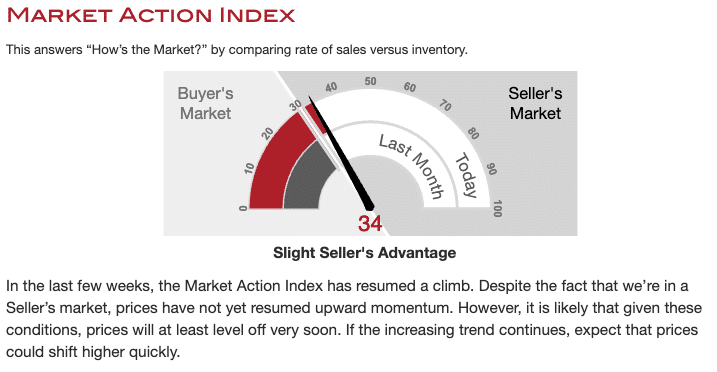In real estate, the market is tied to the basic economic rule of supply and demand, which determines if a market is a buyer’s market vs seller’s market. Sure, certain seasons might have more foot traffic than others, but the housing market could vary drastically from neighborhood to neighborhood. I’ll help you identify “Is it a buyer’s or a seller’s market?” and break down the important concepts for you to explain to your clients.
Buyer’s Market vs Seller’s Market: Definitions
What Is a Buyer’s Market?
Key Takeaways:
- Buyers have leverage: Buyers have more power in a buyer’s market—which means better negotiation terms.
- Strategic home searching: The high inventory allows buyers to be choosy. Your focus should be on analysis to help your buyers focus on what they really want.
- Standout sellers: Sellers (and their agents) must focus on marketing, repairs, and competitive pricing to stand out and snag offers.
- Preparation and presentation: Sellers should focus on depersonalizing and decluttering their homes to appeal to a wide range of buyers.
When supply exceeds demand, we see a buyer’s market. This phenomenon means there are fewer buyers than there are homes for sale. In this scenario, buyers have a bit of leverage. Competition is lower for a home, and the number of days on market increases for listings. A buyer’s market can be determined by calculating the months of inventory. Anything more than six months is traditionally considered a buyer’s market.
What Does a Buyer’s Market Look Like?

A buyer’s market means that your buyers have the upper hand in terms of negotiation. At its core, a buyer’s market means that supply is higher than demand.
With a buyer’s market, new listings are common. You can expect to see:
- High real estate inventory
- Fewer interested buyers
- Sellers ready to negotiate
Pro Tip
Need to snag more buyer leads? You can utilize zBuyer to fill your pipeline with leads on-demand. Check out zBuyer at the link.
What Is a Seller’s Market?
Key Takeaways:
- Sellers’ advantage: Sellers have the upper hand due to limited supply. You can expect quicker sales and potentially rising prices due to high competition and scarce supply.
- Quick decisions for buyers: Due to the intense competition, buyers must be fully prepared to make a strong offer—sometimes even above asking price.
- Strategic pricing is key: Sellers (and their agents) should price homes to attract buyers—this could spark a bidding war that drives up the price. Pricing can fluctuate rapidly in a seller’s market.
- Sellers still need to prepare: While the market favors sellers, buyers still gravitate to well-prepared listings priced right, marketed effectively, and presented in the best possible light. These homes will stand out and may even sell quicker (and for more money)!
- Help your buyer navigate challenges: Your buyers will have limited leverage in negotiating the deal. They also need to move fast. Help coach your clients on patience as well as being ready to act fast when needed.
When demand exceeds supply, we see a seller’s market. This means there are fewer homes than there are buyers. This has been a common challenge for many agents and homebuyers in the market lately.
In this scenario, sellers have the upper hand in negotiations. Buyers are hungry for homes, and there aren’t enough to go around. Traditionally, the number of days on market is low. A seller’s market is outlined by calculating the months of inventory. Anything less than six months is traditionally considered a seller’s market.
What Does a Seller’s Market Look Like?

A seller’s market will have few homes for sale and plenty of buyers scrambling to make an offer. This keeps home prices high and leaves buyers little room for negotiation.
You can also expect to see:
- Homes selling in under 30 days
- Cash offers increase
- Housing prices increase
- Limited home renovations
- Little wiggle room for buyers
- Stiff competition for homes
Buyer’s Market vs Seller’s Market Conditions: What Kind of Market Is This?
Defining what the market looks like is one of those key real estate terms you need to know. To help you determine the current state of the real estate market, whether it’s a buyer’s market vs seller’s market, you’ll want to look at six key data points. Those include:
- Real estate inventory
- Recent sales
- Pricing trends
- Days on market
- Market trends
- Specific local neighborhood trends
We can calculate the current housing supply by calculating the months of inventory. This is the number of months it would take for the current supply of homes on the market to sell (assuming homes keep selling at the current pace). Historically, six months of inventory has been associated with a balanced market.
How can I calculate months of inventory in real estate? To calculate the real estate months of inventory, simply divide the number of active listings by the number of homes sold. In our scenario above, this would be 7,730 divided by 3,740 to get 2.06. This means we have roughly two months of inventory. Anything less than six is traditionally considered a seller’s market.
For those of us who have been practicing real estate since 2011, it’s arguable whether or not you’ve seen a true buyer’s market. You might want to ask your managing broker if they remember (perhaps back when they were an agent) what the market was like 15 years ago. Times have changed!
In fact, the most recent data from the National Association of Realtors (NAR) Housing Shortage Tracker has highlighted that most metropolitan areas in the United States need to build many more houses for housing supply to keep up with a massive demand for housing.

According to the U.S. Census Bureau and NAR calculations, most metro areas are far short of the housing permits required to keep pace with the number of jobs generated in the areas. NAR started tracking this data in 1999. Historically, one housing permit is issued for every two new jobs in the area.
Home prices have increased by 44% in the last six years, while housing inventory has decreased by 13% nationwide. Many areas nationwide feel these effects even more dramatically, with current housing supply at record lows. The dark red areas notated on the map below have a severe housing shortage. Want more real estate statistics? We’ve got you covered.
Impacts & Advice for Agents on Real Estate in Each Market
Impacts on Real Estate in a Buyer’s Market
Your buyers might have a long list of properties they’re interested in. In fact, you might have to help them limit their search to find the right home. I know it’s hard to imagine, but consider putting in your buyer’s specific criteria (three bedrooms, a detached garage, and pool) and the MLS returning over a dozen listings in a neighborhood. Now it’s time to get even more limited—this is where your expertise comes in as a buyer’s agent.
Regarding the real estate landscape in a buying market, you can expect a decrease in home prices as listings grow stale and stagnant. Your buyers can appreciate price cuts and a much better stance for negotiation—perhaps now those sellers will replace that HVAC unit to keep the deal moving.
Guidance for Buyers in a Buyer’s Market
There are a lot of advantages to purchasing a home in a buyer’s market vs a seller’s market. You’ll need to help your buyers be specific about what they want in a home—remember that in this market, you and your buyers have the upper hand in a negotiation! Agents must be diligent about analyzing comps, exploring available properties, and leveraging the number of days on market to help their buyers score a better deal.
Pro Tip
Given first-time buyers’ challenges (especially in competitive markets), you must ensure you’re ready to make an offer. This means you’ve got a pre-approval in hand and that you understand the importance of being flexible. Need help? We have six must-have real estate buyer’s agent checklists ready for you.
Guidance for Sellers in a Buyer’s Market
For those sellers in a buyer’s market, you must be strategic about selling your home. That’s part of being a successful real estate agent, after all! We have some tips:
- Make your property stand out through marketing and continued outreach
- Make those needed repairs
- Depersonalize and declutter
- Price competitively and perhaps even offer seller concessions in negotiations
Impacts on Real Estate in a Seller’s Market
In a seller’s market, bidding wars are common and new listings can be rare. When a new listing hits the market, you’ll see multiple showings and possibly multiple offers in just a few days. In the current real estate market, with housing supply at record lows, buyers scramble to see a home and offer as quickly as possible.
Guidance for Buyers in a Seller’s Market
Listen: Buyers in a seller’s market may experience challenges. But that doesn’t mean homes aren’t selling. As an agent, you are your client’s trusted adviser. There should be a sense of urgency with your buyers. You need to help them with strategy and help them avoid settling for less than what they want. That’s one of the pros of being a real estate agent!
- Your buyers will need to act fast.
- There may be disadvantages, like limited inspection objections and cash offer competition.
- Coach your buyers to remain patient. The perfect home may not be available, but you can find one that checks your most important boxes.
Guidance for Sellers in a Seller’s Market
For your sellers, it’s imperative that you price appropriately. Some sellers may want higher or lower prices to game the market for a multiple-offer scenario. Some agents may be reluctant to disclose other offers and terms to buyers and their agents, but the REALTOR Code of Ethics doesn’t prohibit that disclosure. It’s best to be transparent about the offers you’ve got in hand. Of course, as always, note that in some cases, state law or real estate regulations could limit your ability to disclose terms of an offer. Always check with your local regulatory board.
In a competitive market, you’ll need to work to market the property to help it stand out. You’ll need to generate that interest in your property. Don’t forget the importance of preparing your home. And if you need help thinking outside the box, we’ve got lots of tips for real estate marketing for listings.
Pro Tip
Sellers can get frustrated when their listing sits on the market, waiting for a buyer. You might need to be flexible to stand out in a market flooded with options. For agents, offering advice on cost-effective improvements, staging tips, and accurate pricing is essential. To help, we’ve put together our ultimate real estate listing marketing checklist.
FAQ
How do interest rates affect a buyer’s or seller’s real estate market?
Rising interest rates can help cool down a hot seller’s market by reducing affordability for buyers. A modest change in interest rates could affect your mortgage by thousands of dollars—a rate change of just half a percentage point could increase your mortgage by hundreds per month. When lenders look at approving buyers for a mortgage, they traditionally calculate the monthly payment amount to stay within a certain debt-to-income ratio. Interest rate changes can affect your budget for a home by $25,000 or more.
For instance, with a $300,000 mortgage, a half-percent interest rate increase could raise the monthly payment by about $90, which adds up to $32,400 over a 30-year loan term. That’s the price of a new car!
What is absorption & absorption rate?
This is a way to look at the rate at which homes sell in a certain area. This can tell you how hot the market is—either a buyer’s or a seller’s market.
You can look at absorption in two different formats. One, you can view it as a percentage. The other is the more common months of inventory.
How can I calculate months of inventory in real estate?
To calculate the real estate months of inventory, simply divide the number of active listings by the number of homes sold. In our scenario above, this would be 7,730 divided by 3,740 to get 2.06. This means we have roughly two months of inventory. Anything less than six is traditionally considered a seller’s market.
What about the absorption rate?
Absorption is an easy calculation and very similar to months of inventory. Determine how long you want to look back (we recommend no more than 90 days). Simply divide the number of homes sold in that time period by the total number of homes for sale.
For example, let’s calculate the absorption rate for Cook County, Ill. In one month, let’s assume there were 7,730 total active listings and 3,740 homes sold. By our calculations, that would be 0.479, or roughly 48%. As a rule, anything lower than 15% indicates a buyer’s market.
Can market conditions vary within the same city or region?
This is an important point—a micro-market could exist within a large metropolitan area. Once you dig into certain neighborhoods, you’ll find that some have much cooler markets than others. There are lots of reasons for this. Think: school districts, local amenities, or economic development.
This is why a local market analysis is extremely important for agents. It’s easy to sketch out an area in the MLS and do some quick napkin math to find out the months of inventory. This will really help inform you and your clients on what strategies you should take to ensure your clients are happy. Your sellers can optimize pricing and marketing strategy, and your buyers could find a hidden gem in an untapped market.
Is it a buyer’s or a seller’s market?
The great thing about this calculation is that it can be done in localized markets, like a certain neighborhood, to see if that region is trending higher or lower than the surrounding areas. When a client is interested in a certain neighborhood, do your calculations to compare what you see in the ZIP code or the city. That can help inform your clients on how competitive their offer should be.
Are there tools I can use to make these calculations easy?
There are lots of tools you can use at your disposal as an agent. The first would be your local MLS. Next, I’d recommend looking up the ZIP code or the home on Realtor Property Resource, which your MLS normally provides.
Lastly, don’t forget about data aggregator tools like Altos Research. You’re bound to get the most common question for agents: “How’s the market?” Take some time every week to analyze your local market. You can subscribe to your ZIP code to get actionable insights on current data. See the snapshot below for what you can expect:

Bringing It All Together
Navigating the real estate market can seem tough, but knowing whether it’s a buyer’s market versus seller’s market makes a big difference. I have to caution that timing the market is tricky. However, strategic actions based on market conditions are exactly how to create a successful “win” for your client. Your job is to ensure you know how to look out for (and how to make) smart decisions. After all, the house you looked at today and wanted to think about until tomorrow may be the same house someone looked at yesterday and will buy today.
Remember that every neighborhood can be different, and things out of our control play a big part—like interest rates. But by keeping an eye on those details, you can make choices that work best for you and your clients. Now that you’re armed with this knowledge, you should be able to answer confidently when people ask, “How’s the market?”






Add comment